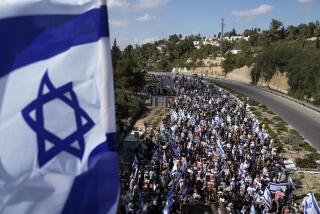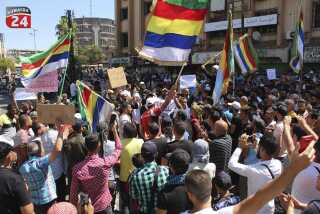Protesters slam Egypt government two years after revolution
CAIRO -- Young men and boys clashed with security forces as tens of thousands of Egyptians protested Friday against the Islamist-led government’s failure to fix the economy and heal the politically divided nation two years after the overthrow of Hosni Mubarak.
The anniversary of the revolution that led to Mubarak’s downfall was marked more by rancor than joy as familiar and troubling scenes played out across the country: Rock-throwing youths lunging at police through clouds of tear gas while peaceful demonstrators waved banners and shouted epithets against those in power.
President Mohamed Morsi has been engulfed by months of anger from secularists, who claim he and his Muslim Brotherhood party have turned increasingly authoritarian in a bid to advance an Islamic state at the expense of social justice. The protests were the latest reminder of the volatile politics and persistent mistrust that threaten Egypt’s transition.
PHOTOS: 2011 Egyptian protests
“Morsi is finished,” said Tarik Salama, an activist. “A big part of the population hates him now. It’s too late for him to turn around and say, ‘Hey guys, I love you.’ He’s in the same place as Mubarak was two years ago.
“Morsi’s biggest problem is that he failed to unify the country. A lot of people voted for him, but he failed.”
One banner raised in Tahrir read: “Two years since the revolution, and Egypt still needs another revolution.” Protest chants harked back to the 18-day revolt that toppled Mubarak but were now directed at Morsi: “Leave, leave.”
The days ahead may prove more violent. Many of the youths clashing with police in Cairo, Alexandria and other cities are angry over an economy that offers little hope. They have been joined by hard-core soccer fans, known as Ultras, demanding that police officials be held accountable in the deaths of 74 soccer fans killed last year in a stadium riot.
A court verdict in that case is expected Saturday.
In recent days, youths in Cairo have battled police with stones and gasoline bombs around high cement barricades blocking streets leading from Tahrir Square to the parliament. Young men pulled part of the wall down but police drove them back, firing steady volleys of tear gas that cloaked the square and drifted over the Nile.
“These young men and kids have no jobs,” said Salama. “The young in Egypt feel there is no future for them. This is the big danger.”
By dusk Friday, youths with rags and scarves over their faces hurled stones and rushed barriers, preparing for another night of clashes. The unrest spurred the emergence of an anarchist group, known as the Black Bloc, whose masked, black-clad members threw Molotov cocktails and attempted to overrun the presidential palace and the upper house of parliament or Shura Council.
More than 60 protesters and at least 30 police have been injured nationwide since early Friday in clashes that also led to attacks on offices of the Muslim Brotherhood.
The backlash against Morsi intensified in November when he expanded his presidential powers and, sidestepping the courts, pushed through a referendum on an Islamist-backed constitution. The liberal opposition, which has long been disorganized, attacked him for spoiling promises of democracy that inspired the 2011 revolution.
Morsi has said his actions were an effort to root out Mubarak-era loyalists from the government and propel the country toward parliamentary elections in the spring. But his biggest challenge, perhaps, is Egypt’s troubled economy that has lost more than half of its foreign reserves and worsened conditions for about 40% of Egyptians who live on $2 a day.
ALSO:
Afghan bomber targets NATO convoy, kills 5 civilians
Afghanistan’s new generation: Modern, ambitious ... naive?
U.N. expert launches investigation of drones, targeted killings
More to Read
Sign up for Essential California
The most important California stories and recommendations in your inbox every morning.
You may occasionally receive promotional content from the Los Angeles Times.











